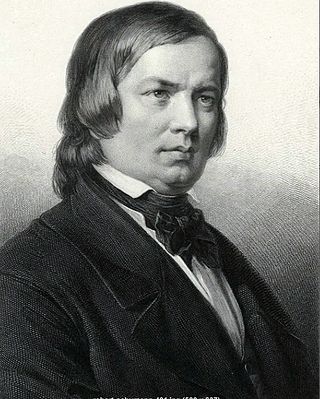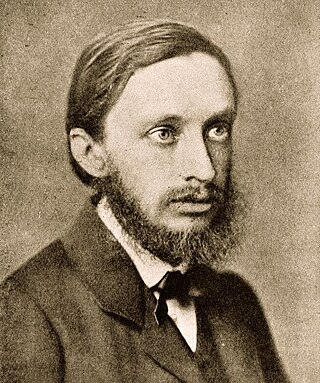Related Research Articles

Robert Schumann was a German composer, pianist, and influential music critic. He is widely regarded as one of the greatest composers of the Romantic era. Schumann left the study of law, intending to pursue a career as a virtuoso pianist. His teacher, Friedrich Wieck, a German pianist, had assured him that he could become the finest pianist in Europe, but a hand injury ended this dream. Schumann then focused his musical energies on composing.

Johann Christoph Friedrich von Schiller was a German polymath and poet, playwright, historian, philosopher, physician, lawyer. Schiller is considered by most Germans to be Germany's most important classical playwright.

Johann Christian Friedrich Hölderlin was a German poet and philosopher. Described by Norbert von Hellingrath as "the most German of Germans", Hölderlin was a key figure of German Romanticism. Particularly due to his early association with and philosophical influence on Georg Wilhelm Friedrich Hegel and Friedrich Wilhelm Joseph Schelling, he was also an important thinker in the development of German Idealism.

Joseph Joachim was a Hungarian violinist, conductor, composer and teacher who made an international career, based in Hanover and Berlin. A close collaborator of Johannes Brahms, he is widely regarded as one of the most significant violinists of the 19th century.

Frauen-Liebe und Leben is a cycle of poems by Adelbert von Chamisso, written in 1830. They describe the course of a woman's love for her man, from her point of view, from first meeting through marriage to his death, and after. Selections were set to music as a song-cycle by masters of German Lied, namely Carl Loewe (1836), Franz Lachner (c1839), and Robert Schumann (1840). The setting by Schumann is now the most widely known.

Hermann Gustav Goetz was a German composer who spent much of his career in Switzerland. He is best known for his 1872 opera Der Widerspänstigen Zähmung, based on Shakespeare's The Taming of the Shrew.

"Der König in Thule" is a German poem by Johann Wolfgang von Goethe, written in 1774.

Graham Waterhouse is an English composer and cellist who specializes in chamber music. He has composed a cello concerto, Three Pieces for Solo Cello and Variations for Cello Solo for his own instrument, and string quartets and compositions that juxtapose a quartet with a solo instrument, including Piccolo Quintet, Bassoon Quintet and the piano quintet Rhapsodie Macabre. He has set poetry for speaking voice and cello, such as Der Handschuh, and has written song cycles. His compositions reflect the individual capacity and character of players and instruments, from the piccolo to the contrabassoon.
Friedrich Schiller's skull has been the source of much controversy. Schiller was one of the most famous poets in German history. Long believed to be entombed in the Fürstengruft in Weimar, Germany, the location of the writer's skull is now unknown.

Christian Gerhaher is a German baritone and bass singer in opera and concert, particularly known as a Lieder singer.

"Der Handschuh" is a ballad by Friedrich Schiller, written in 1797, the year of his friendly ballad competition with Goethe. Other ballads written that year include Schiller's "Der Gang nach dem Eisenhammer", "Die Kraniche des Ibykus", "Der Ring des Polykrates", "Ritter Toggenburg", "Der Taucher", and Goethe's "Die Braut von Korinth", "Der Gott und die Bajadere", "Der Schatzgräber (Goethe)", "The Sorcerer's Apprentice".

West–östlicher Divan is a diwan, or collection of lyrical poems, by the German poet Johann Wolfgang von Goethe. It was inspired by Goethe's readings of the Persian national poet Hafez.

Der Handschuh is a composition by Graham Waterhouse. He wrote the setting of Friedrich Schiller's ballad for cello and speaking voice in 2005. It was published in 2007 in Heinrichshofen's Verlag.
Handschuh may refer to:
Nikolaus Freiherr von Krufft was an Austrian composer and civil servant.

"Wiegenlied", Op. 49, No. 4, is a lied for voice and piano by Johannes Brahms which was first published in 1868. It is one of the composer's most famous pieces.
Virginia Livia Frege, née Gerhardt was a German singer (soprano), Prima Donna of the Leipzig Stadttheater, arts patron and co-founder of the Leipzig Bach Society. She was referred to as the "Queen of Leipzig's romantic song singing". Frege is best known for her performances of the works by Felix Mendelssohn Bartholdy. Her repertoire included songs by Heinrich Marschner, Franz Schubert, Robert Schumann and Mendelssohn.

Balladenjahr refers to the year 1797 in the history of German literature, in which many of the best-known ballads of Johann Wolfgang von Goethe and Friedrich Schiller originated within a few months, such as Goethe's "Der Zauberlehrling" and Schiller's "Der Ring des Polykrates", "Der Taucher", "Der Handschuh", "Der Gang nach dem Eisenhammer", "Ritter Toggenburg", and "Die Kraniche des Ibykus".
References
- ↑ "Der Handschuh, Op 87 (Schumann) - from CDJ33111 - Hyperion Records - MP3 and Lossless downloads". www.hyperion-records.co.uk. Retrieved 2023-07-28.
- ↑ "Friedrich von Schiller (1759-1805) - Schumann-Portal". www.schumann-portal.de. Retrieved 2023-07-28.